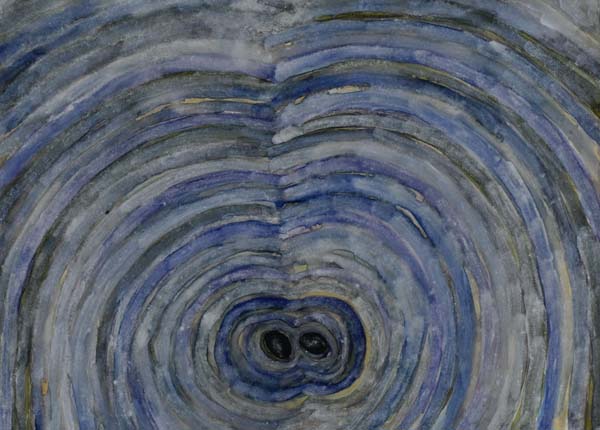From: Mineke Schipper, Humanity’s End as a New Beginning: World Disasters in Myths

6. Deucalion and Pyrrha
(Greek, Latin)
In human form the Greek supreme god Zeus (called Jupiter by the Romans) had left the heights of mount Olympus and visited the earth. He felt deeply shocked by the misbehaviour and lack of hospitality of the human race. In the council of the gods he found support for his decision to destroy humankind. The gods agreed, but they were also grieving about the coming end of humanity and wondered what the earth would be like without people.
Jupiter let loose the South wind. With dripping wings, a beard heavy with rain, brows shrouded in mist, and water streaming from his hairlocks, robes and wings, he crushed the clouds in his hands and the rains poured down from the sky. Iris clad in rainbow colours supplied more nourishment to the thirsty clouds. Neptune, the god of the sea assisted his brother Jupiter by lending him his waves and ordered the rivers to rush down in frenzied torrents. He struck the earth with his trident so that it trembled and opened channels of water from the deep. The rivers overflowed their banks, whirling and swirling over crops and orchards, sweeping away cattle and men, houses and temples, and sacred images. If some buildings survived this disaster, soon the roofs were submerged by high rising waves. All was sea now, a sea without shores. All people had been swallowed by the waters. The whole earth was empty except for two good and upright elderly people, Deucalion and Pyrrha. They had miraculously survived the end of the previous world thanks to Deucalion’s father Prometheus who had built a ship for them and warned them to be prepared. They had been floating on the rising water and got stuck on the high mountain Parnassus with twin peaks rising higher than the clouds. Their first action was to offer prayers to the local mountain deities and kneel before Thetis, the oracle goddess.
Jupiter saw that the whole earth had been covered by waters, and that only one man and only one woman had survived out of so many thousands – two guiltless worshippers of the gods. Assisted by the North wind he pushed away the storm clouds and called the sea god Triton who came rising from the deep, his shoulders glistening with shellfish. At the request of Neptune he recalled waves and rivers by blowing at his conch shell and calmed the sea thanks to the echoes of his signal heard by all the waters covering earth and sea. The sea had shores again, the floods sank down, hills emerged from beneath the water, and treetops appeared, with mud sticking to their leaves.
The world was there again, but Deucalion looked around, there was the emptiness of the desolate lands lying there in complete silence. Tears filled his eyes, and he said to Pyrrha: “We are the only people left on the earth. The sea has taken all else. The clouds still frighten me. How are we going to survive? I wish I could fashion new people from earth and breathe the breath of life into them, by my father Prometheus’ skills. We have been left here as the only samples of mankind.” Those were his words, and they were both weeping.
How could those two old people do what they had to do: start anew and re-populate the earth? Desperately sad and worried about the future of the human race they prayed and decided to consult the holy oracle, but the answer was obscure. They had to shroud their heads, loosen the girdles of their garments and throw the bones of their mothers behind them. The bones of their mothers? The answer made them speechless. Both their mothers were dead! Pyrrha was scared. Wouldn’t she injure her mother’s ghost by disturbing her bones? What to do?
Finally they interpreted the oracle’s message as referring to the bones of Mother Earth, the rocks lying on the riverbank. With veiled heads they stooped and picked up pieces of rock which they threw over their shoulders. And who would believe what followed, if not for witness bearing ancient tradition? The stones lost their rigidity and gradually grew soft. Softened, they grew in size and took a sort of human shape. They looked like unfinished marble statues. Gradually the moist earthy parts became the body, whereas the solid and inflexible parts became bone. The veins in the rock kept the same name. After some time the stones thrown by Deucalion turned into men, and the stones thrown by Pyrrha, into women. Thanks to the stones from which we originated long ago, we came to be a tough race, used to toiling for our daily bread.